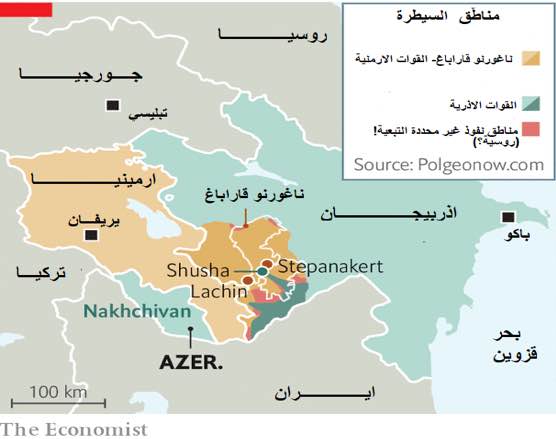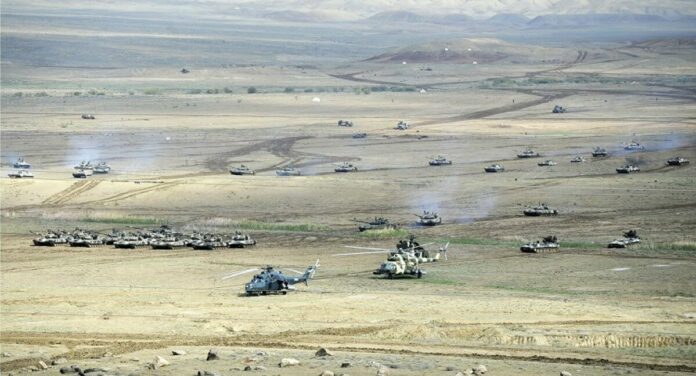Dr. Ali Abbas, Ph.D. in Ancient South Eastern History, University of Warsaw.
On the night of 9-10 November, Russia (and Turkey with a smaller part) won a great victory after reaching the agreement in Nagorno-Karabakh [1], but on the other hand, that agreement was a loss for the Armenian and Azerbaijani sides as well! At this moment, no one knows the details, but, as many media sources have reported, Russia has sent 2000 soldiers to the Nagorno-Karabakh territory.
This document of understanding was signed by Nikol Pashinyan, Ilham Aliyev, and Vladimir Putin after a series of dramatic events and jarring swirls of false news and media tuition, which aimed to dig under Pashinyan and build a strong foundation for a change of power in Yerevan, which is key to understanding successive events.
On the 7th of November, the residents were suddenly evacuated in the village of Stepanakert [2], were taken on rough mountain roads. This is one of the most important reasons for the sudden decision to evacuate by the above agreement.
In fact, the Azerbaijani bombardment on the front lines intensified at the beginning of this November, but even so, the situation did not lead to the declaration of Armenia’s loss no white flags were waving. The Azerbaijani forces have not advanced significantly, as they claimed in their media. Except in the city of Hadrut, where the Azerbaijanis took control of the uninhabited valley, located on the borders of Nagorno-Karabakh before 1991[3], they claimed an incursion between the city of Hadrut and Shusha.
It should be noted that the term “Armenian side” is referred to here as the Republic of Artsakh Defense Army, not Armenia. Artsakh has not formally introduced its military capabilities into this armed conflict. This has prompted the outcry of the Armenian street, particularly by some security experts (some of who have tendencies to Russia), Armenia should’ve bombed the Azerbaijani city of Ganja and the pipelines network from Azerbaijan through Georgia to Turkey. They suggested that Pashinyan did not do so under pressure from Europe, which in return hasn’t given Armenia any assistance worth mentioning. It was certain that the cost of Armenia’s official involvement in this armed conflict would be to move these battles to their geographical depth. This would allow Turkey to intervene militarily in the bombing of Armenia, but on the other hand, this would lead the Russian side to respond through counter-attacks protecting Armenia in view of the military alliances concluded between the two parties.

Despite the lack of information on Russian arms carriers entering Armenia and from Armenia to the Republic of Artsakh, there is no conclusive evidence to indicate the arrival of such supplies; This is due to the logical analysis of how Russia benefits from the worsening problems in this region, which will lead Armenia to request an official Russian military presence on its territory, which Russia is eager to do when Russia will be assured of its control, which has gradually begun to escape its hands.
After the 2018 revolution in Armenia, power was in Pashinyan’s hands, who initiated attempts to diversify his foreign policy with great care by intensifying cooperation with Europe, as well as Joe Biden’s victory in the American elections and his assistant Kamala Harris, who has close ties to the Armenian community, could mean to Russia another real threat to weaken its influence in Armenia by invading the dominance of Western influence over the territory of the South of the Caucasus. But coming to terms with the Turkish incursion into the same region means that Russia has a small evil that must be controlled by the distribution of areas of influence in the region between the Russians and the Turks.
On the 9th of November, after two days of questionable evacuation in the village of Stepanakert and the siege of the President of Artsakh, all this led to the loss of control by the Republic of Artsakh over the town of Shushi, which was made public by Pashinyan, and there is ample evidence of lying in this information; This led to a rise in opposition votes in Yerevan, where expectations focused on the night that Pashinyan would be ousted by Russian-leaning opposition political forces, who accused him of loss and demanded that he step down from the presidential chair. [5]The logic behind these accusations has focused on Pashinyan’s tendencies on his Western-oriented policy, which in turn has led to a decline in his cooperation with the Russian side. This has already been reflected in Armenia’s loss of Russian support in the face of the Azerbaijani-Turkish attacks, in order to demonstrate to the Russian will that Armenia is ripped off without Russian support and that any isolation in its policy will lead to a decline of the security situation.
It should be noted that, in fact, Aliyev and Turkey were not prepared to engage in a confrontation with the Russian Armed Forces, so the threat of Russian interference forced Baku and Ankara to accept Russian terms, which are not considered impossible for Turkey and Azerbaijan since accepting Turkey would mean integrating the South Caucasus and the Turkish-Russian Transit Organization. It is difficult to exclude (especially since we do not know the details of the agreement) that in the future Turkish-Russian military patrols will appear in Nagorno-Karabakh; In this regard, Turkey’s greatest achievement is the extension of its full control over Azerbaijan and that the Russian Federation, by contrast, becomes the leading player in the region; In the outcome, this means the division of influence between the two main parties, Turkey and Russia, who will fight attempts to interfere by any third party.
In addition, many questions remain, and only information on the Agreement has not resulted in the confirmation of the return of the Azerbaijani administration to Nagorno-Karabakh, but it is known that the rest of the region is currently under Russian control. About Azerbaijan’s control, the territory controlled by the Republic of Artsakh, which prior to 1991 had not been traced to Nagorno-Karabakh, will be restored. The question is: Would it be a percentage of Azerbaijani control over Nagorno-Karabakh? And if the answer is yes, what are the features of the Russian role in this situation? Time will tell, but Russia will certainly not give much to the Azerbaijanis, the Armenians will not return to Artsakh; Russia would thus lose influence in Armenia, and that was what the Western Forces were racing that the Russians had failed the Armenians; This is what is being heard in Yerevan by demands for continued fighting and the rejection of the ceasefire agreement.
At this moment, we can sum up the winners and the losers of this agreement:
- Russia will extend its full control over Armenia and Artsakh will remain its colony.
- Russia will come close to alienating Armenian power and blocking Armenian influence tilted to the West.
- Turkey will take over Azerbaijan and expand transit territories in line with Russia in the South Caucasus region.
- The West will completely lose influence in the area above.
- Armenia will lose its influence in Artsakh and remain under the threat of full submission to Russia, which through its strong military presence in Artsakh will force the whole of Armenia into full submission, which could lead to objections on Armenian Street in general.
- Data strongly indicate that Nagorno-Karabakh will lose the Azerbaijani administration and that Russian forces will open the road between the region and Armenia; This could lead to the overthrow of the Aliyev rule; Turkey would then remove him from Government and replace him with a new authority fully under Turkish administration.
[1] https://www.bbc.com/news/world-europe-54882564
[2] https://www.ruptly.tv/en/videos/20201108-059-Nagorno-Karabakh–Mass-evacuation-of-Stepanakert-residents-continues-amid-alleged-capture-of-Shushi
[3] https://www.bbc.com/news/world-europe-18270325
[4] source: The Economist (interdate: 14-XI-2020) Modified by Dr. Ali Abbas Hassan.
[5] https://www.france24.com/en/live-news/20201110-karabakh-truce-spells-turmoil-for-armenian-leader-pashinyan










